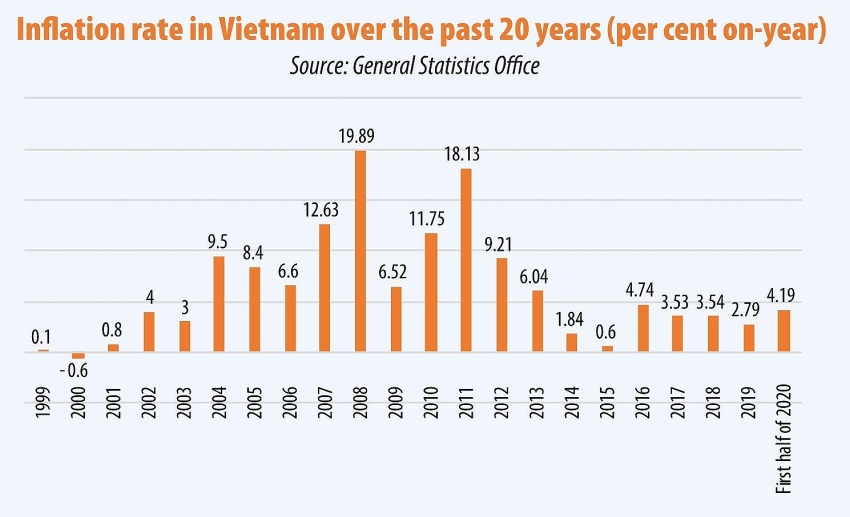Vietnam: Belt-tightening goes on as business attempts recovery
Despite a five-year high in first-half consumer price index, Vietnam is expected to bring inflation under control this year due to feeble demand for production and consumption, as well as shrunken demand in global markets.
Dang Duc Anh, vice director of the National Centre for Socio-Economic Information and Forecast (NCIF), told VIR that though the six-month consumer price index (CPI) climbed 4.19 per cent on-year, the highest ascension in the first six months in the 2016-2020 period, the government may be able to rein in inflation at below 4 per cent as planned by the National Assembly.
“The domestic economy’s production remains weak, with enterprises finding it very difficult to recover performance, meaning their demand for goods and services are still slack,” Anh said. “We see that the number of enterprises leaving the market is still large.”
The government last week reported that in the first half of 2020, the number of enterprises halting operations was 29,200, up 38.2 per cent on-year, and 22,400 enterprises were not operating at their registered addresses, up 34 per cent on-year. Moreover, about 1.8 million passengers and 808 million tonnes of goods were transported, down 27.3 and 8.1 per cent on-year, respectively.
For example, Singaporean-invested Indo Trans Logistics Corporation has suffered from significant slashes in its goods transportation, at 30-50 per cent as compared to the same period last year.
“We are trying to stay afloat until the pandemic ends, and we will have to change our business plan. Demand for transportation has shrunk remarkably,” said a representative from the company, which has 200 tractor trailers and 110 trucks. “Furthermore, demand for goods from the US and the EU markets have strongly declined, making a dent in the logistics market.”
In another case, Nguyen Van Tinh, worker from Japanese-invested Chyoda Integra Vietnam, told VIR he has resumed normal work over the past two months.
“However, we are paid only 80 per cent of the salary because the company has not fully recovered and it has been unable to boost exports to Japan and Europe,” Tinh said.
The company churns out products used for copier paper guides, static elimination parts, and ink absorption parts of toner cleaners and printers. Its six-month revenue fell by half against the previous year.
“My wife is also working at another Japanese company, with a salary of 70 per cent as compared to the pre-pandemic period. Like my company, hers has yet to recover completely,” Tinh added.
According to Anh of the NCIF, in the first six months of the year, people have had to tighten their belts, meaning their demand for goods is slack. Besides that, the tourism sector has also suffered from significant dents.
Specifically, the six-month number of international tourist arrivals to Vietnam is estimated to be 3.74 million, down 55.8 per cent on-year. They include those coming by air totalling three million, accounting for 81.2 per cent of total tourist arrivals to Vietnam, and down 54.3 per cent, while those coming to Vietnam by road hit 559,600, down 66.8 per cent on-year.
“Thus, given the COVID-19 situation worldwide and feeble demand in the domestic market, it is expected that the inflation rate in Vietnam this year will be about 4 per cent,” Anh stressed.
A number of international organisations have also forecast that inflation in Vietnam will increase below 4 per cent this year.
For example, the Asian Development Bank has just predicted that in the latter half of 2020, growth in Vietnam through agriculture, industry, and services is forecast to continue to decelerate this year as a result of the sharp fall in external demand. VIR
Nguyen Dat
Source: https://vietnamnet.vn/en/business/belt-tightening-goes-on-as-business-attempts-recovery-657269.html


 English
English




